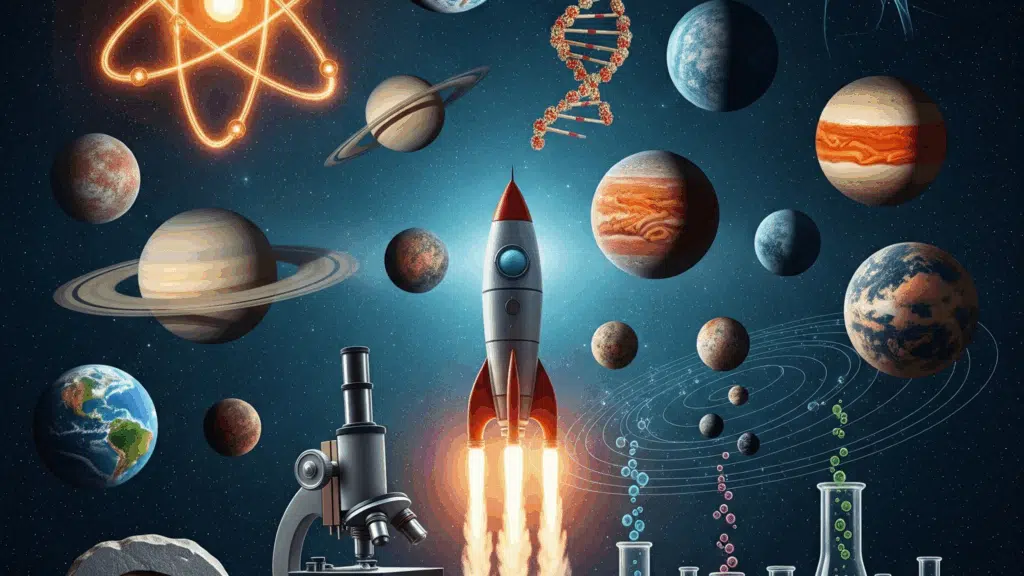Want to study the world of science through quiz questions? This collection of trivia questions covers three main areas that will help you discover facts about life, our planet, and the physical world.
The questions are divided into Life Science, which covers living things like animals, plants, and the human body. Earth & Space explores our planet, weather patterns, and the solar system. Physical Science focuses on matter, energy, and how things work in the natural world.
Use these science trivia questions for classroom activities, family game nights, homeschool lessons, or just to test what you know about the natural world around you.
Think You Know Science? Try These Trivia Questions!
These trivia questions help make learning science more exciting by turning facts into games that students can play while finding out new information about the world around them.
Life Science

Life Science trivia questions focus on living things like the human body, animals, plants, and how they grow and survive.
These questions help students learn interesting facts about biology and nature while testing their knowledge about the living world around them.
-
What is the largest organ in the human body?
Ans. Skin -
What do bees collect from flowers?
Ans. Nectar -
Which part of the plant makes food?
Ans. Leaves -
What is the process by which plants make food?
Ans. Photosynthesis -
Which animal is known as the king of the jungle?
Ans. Lion -
What do you call animals that eat only plants?
Ans. Herbivores -
Which bird is known for mimicking sounds?
Ans. Parrot -
What do we call baby frogs?
Ans. Tadpoles -
What gas do humans breathe in?
Ans. Oxygen -
What type of blood cells help fight infection?
Ans. White blood cells -
What is the basic unit of life?
Ans. Cell -
Which part of the body helps us pump blood?
Ans.Heart -
What do you call animals that eat meat and plants?
Omnivores -
What part of your body lets you see?
Ans. Eyes -
What do we call a scientist who studies animals?
Ans. Zoologist -
What organ helps you breathe?
Ans. Lungs -
What is the name of the colored part of your eye?
Ans. Iris -
What do we call the bones in your back?
Ans. Spine -
What is a baby cat called?
Ans. Kitten -
What do cows drink?
Ans. Water -
What is a group of lions called?
Ans. Pride -
What do fish use to breathe underwater?
Ans. Gills -
What is the job of the roots in a plant?
Ans. To absorb water -
What vitamin do you get from sunlight?
Ans. Vitamin D -
What do you call a scientist who studies plants?
Ans. Botanist -
What is the largest land animal?
Ans. Elephant -
What are animals without backbones called?
Ans. Invertebrates -
What is the outer layer of skin called?
Ans. Epidermis -
What do ants live in?
Ans. Colonies -
What type of animal is a frog?
Ans. Amphibian -
What is the main job of the stomach?
Ans. Digest food -
What are animals that feed their young with milk called?
Ans. Mammals -
Which sense helps you smell?
Ans. Nose -
What does a caterpillar become?
Ans. Butterfly -
How many legs does a spider have?
Ans. Eight -
What kind of blood cells carry oxygen?
Red blood cells -
What part of the plant holds it in the ground?
Ans. Roots
Earth & Space

These questions help students discover amazing facts about astronomy, geology, and meteorology while testing their knowledge about Earth and the universe beyond.
-
Which planet is closest to the sun?
Ans. Mercury -
What causes day and night?
Ans. Earth’s rotation -
Which layer of Earth do we live on?
Ans. Crust -
What is the hottest planet in our solar system?
Ans. Venus -
What do you call frozen water that falls from the sky?
Ans. Snow -
Which planet is known as the Red Planet?
Ans. Mars -
What do we call a scientist who studies the weather?
Meteorologist -
What natural event causes the ground to shake?
Ans. Earthquake -
What is the name of our galaxy?
Ans. Milky Way -
What is the moon’s light actually?
Ans. Reflected sunlight -
What do you call a rock from space that hits Earth?
Ans. Meteorite -
Which planet is the biggest in the solar system?
Ans. Jupiter -
What is the gas layer around Earth called?
Ans. Atmosphere -
Which direction does the sun rise from?
Ans. East -
What is a group of stars that form a pattern called?
Ans. Constellation -
What is the center of the solar system?
Ans. The Sun -
What kind of weather has thunder and lightning?
Ans. Thunderstorm -
What is the frozen part of Earth’s surface called?
Ans. Cryosphere -
Which planet has rings around it?
Ans. Saturn -
What is the spinning of the Earth on its axis called?
Ans. Rotation -
What causes tides in the ocean?
Ans. Moon’s gravity -
What do volcanoes release?
Ans. Lava -
What is the layer under the crust called?
Ans. Mantle -
What do we call the study of Earth?
Ans. Geology -
What is the solid form of water called?
Ans. Ice -
What is the natural satellite of the Earth?
Ans. The Moon -
What type of rock is formed from lava?
Ans. Igneous rock -
What kind of storm forms over the ocean and has strong winds?
Ans. Hurricane -
What tool is used to measure earthquakes?
Ans. Seismograph -
What is the longest river in the world?
Ans. Nile River -
What layer protects Earth from harmful rays?
Ans. Ozone layer -
What planet is farthest from the sun?
Ans. Neptune -
What is rain that falls from clouds made of pollution called?
Ans. Acid rain -
What is the movement of continents over time called?
Ans. Plate tectonics -
What causes a rainbow?
Ans. Light bending through water -
What is the largest ocean on Earth?
Ans. Pacific Ocean -
What planet is famous for its giant red spot?
Ans. Jupiter
Physical Science

Physical Science trivia questions cover concepts from physics and chemistry, including topics like matter, energy, forces, simple machines, and how things move and change.
-
What is H2O commonly known as?
Ans. Water -
What tool is used to measure temperature?
Ans. Thermometer -
What force pulls objects toward Earth?
Ans. Gravity -
What state of matter is air?
Ans. Gas -
Which metal is liquid at room temperature?
Ans. Mercury -
What do we call materials that let electricity pass through?
Ans. Conductors -
What color is a ripe banana?
Ans. Yellow -
Which form of energy comes from the sun?
Ans. Solar energy -
What simple machine is a seesaw?
Ans. Lever -
What does a magnet attract?
Ans. Iron -
What do we call the push or pull on an object?
Ans. Force -
What is the speed of light?
Ans. 299,792 km/s -
What state of matter has a definite shape and volume?
Ans. Solid -
What is the measure of how hot or cold something is?
Ans. Temperature -
What type of energy is stored in food?
Ans. Chemical energy -
What do you call a circuit with one path?
Ans. Series circuit -
What is the symbol for gold?
Ans. Au -
What do we call frozen water vapor on surfaces?
Ans. Frost -
What is the smallest part of an element?
Ans. Atom -
What is needed for fire to burn?
Ans. Oxygen -
What causes things to float or sink?
Ans. Density -
What do you use to see tiny things?
Ans. Microscope -
What is electricity made of?
Ans. Electrons -
What do we call light that bends through a lens?
Ans. Refraction -
What is the unit of force?
Ans. Newton -
What do we call a change from liquid to gas?
Ans. Evaporation -
What is used to store electrical energy?
Ans. Battery -
What is the opposite of a conductor?
Ans. Insulator -
What kind of change is melting ice?
Ans. Physical change -
What kind of energy comes from moving things?
Ans. Kinetic energy -
What do you call a material that can be stretched?
Ans. Elastic -
What kind of machine is a ramp?
Ans. Inclined plane -
What is an object that lets light pass through clearly?
Ans. Transparent -
What happens when light hits a mirror?
Ans. Reflection -
What do we call the center of an atom?
Ans. Nucleus -
What gas do fizzy drinks contain?
Ans. Carbon dioxide -
What is created when two things rub together?
Ans. Friction
The Bottom Line
Science trivia questions make learning fun and help you remember facts better. These questions test what you know and teach you new things at the same time.
You can use them at home, in class, or with friends to make science more exciting.
Now that you have these trivia questions, it’s time to put them to good use. Start a weekly science quiz night with your family. Challenge your classmates during breaks. Or test yourself before big science tests at school.
















